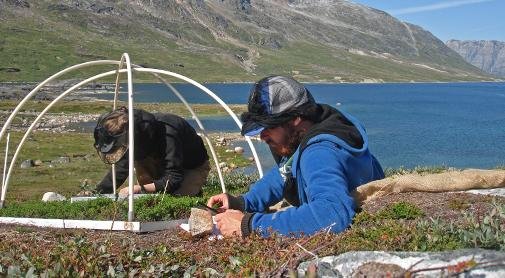Researchers measure the release of volatile compounds by the tiny plants in the arctic tundra. Photo by University of Copenhagen/Magnus Kramshoj
COPENHAGEN, Denmark, April 5 (UPI) -- Plants release an array of gases called biogenic volatile organic compounds, or BVOCs, which work to attract beneficial insects and pollinators, while repelling pests.
New research shows BVOCs are extremely sensitive to climate change and may help slow warming in the Arctic.
When researchers from the University of Copenhagen exposed plants in the Arctic tundra to warmer temperatures, they found a dramatic increase in the release of BVOCs.
"It seems that 3 to 4 times more biogenic volatiles are released from the tundra upon a two degree temperature rise, when the sun has a free rein," Riikka Rinnan, project leader and associate professor of biology, said in a news release.
Higher concentrations of BVOCs could promote cloud cover, researchers say, which could help keep the atmosphere cooler.
"Cloud formation depends on the presence of particles, on which water condenses, and an increased release of volatile compounds from the tundra leads to the formation of more particles in the atmosphere and perhaps clouds," Rinnan explained. "This can have a large impact on the arctic climate."
However, BVOCs also prolong the life of methane, a powerful greenhouse gas and warming agent. And when scientists tested the effects of cloud cover on tundra plants, they measured a 70 percent reduction in the release of BVOCs -- further complicating their role as a coolant.
Perhaps more than anything, the new research -- detailed in the journal Nature Geoscience -- is a reminder of how complicated it is to model the ecological impacts of climate change. The findings are also proof that climate scientists need to pay closer attention to BVOCs.
"In comparison to other biological processes, such as CO2 release through plant respiration, we discovered that the release of volatile compounds in the Arctic is almost 20 times as sensitive to temperature rise," Rinnan said. "And that is surprising".















